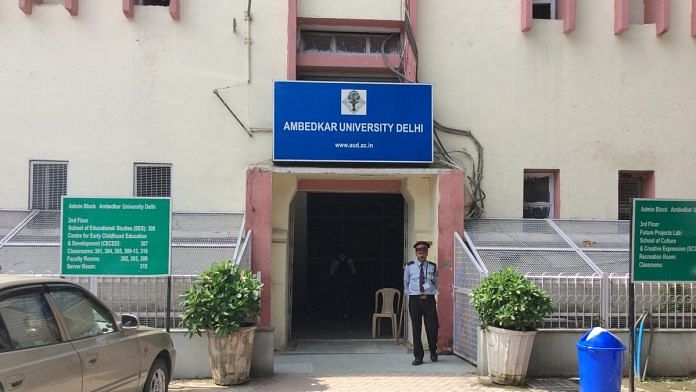Students claim workers are being made to open and clean manholes without any safety gear, as mandated by the law. University administration denies it.
New Delhi: The illegal practice of manual scavenging continues unabated in many parts of India, but it takes on an ironic colour when it allegedly takes place at a university in the national capital named after India’s foremost Dalit icon.
Over the last month, students of Ambedkar University Delhi (AUD) have been protesting against the administration for allegedly turning a blind eye to workers cleaning manholes on campus without any safety gear. The complaint was filed to the university administration on 12 October by the Dalit Bahujan Adivasi Collective (DBAC).
“AUD has crossed all levels of hypocrisy. On one hand, the faculty organises lectures and film screenings, takes out students to experience social movements on caste and manual scavenging, and on the other, the administration turns a blind eye to opening of manholes within the campus,” the DBAC said.
But the university administration told ThePrint: “This is to categorically state that no activity which falls under definition of manual scavenging under the Manual Scavenging Act is being carried out by Ambedkar University Delhi. Also, there are no insanitary latrines at AUD.”
University officials said these queries needed to be addressed by other occupants of the campus as well.
“It may be noted that campus at Kashmere Gate is being shared with various institutions and offices, i.e. IGDTUW, PWD, NCC, State Archeological Department Delhi, Punjab and Sindh Bank and the DMRC,” they pointed out.
Ambedkar University was founded in 2007 by the Delhi government, inspired by Dr B.R. Ambedkar’s belief in education as the right weapon to combat social slavery.
Also read: Why manual scavenging is still a problem for India in 2018 despite a slew of policies
Different definition of manual scavenging
According to the complaint, students had put up posters across the campus, demanding that no one should access the sewers bare-handed, but workers still had to keep doing it.
The complaint also said students had confronted the deputy registrar about this but “he came up with his own definition of manual scavenging and defended how cleaning of sewers/manholes is not ‘manual scavenging’”.
The Prohibition of Employment as Manual Scavengers and their Rehabilitation Act 2013 banned hazardous cleaning of sewers or septic tanks without any protective gear. Offences under this Act are cognisable and non-bailable, and attract stringent penalties.
The law defines a septic tank as “a water-tight settling tank or chamber, normally located underground, which is used to receive and hold human excreta, allowing it to decompose through bacterial activity”.
It further states that a “sewer” means “an underground conduit or pipe for carrying off human excreta, besides other waste matter and drainage waste”.
According to a source, the administration has maintained that the sewers on campus which are being operated upon by the workers are free of any faecal matter. “However, further investigation has to be carried out in this matter,” the DBAC said.
The law also states that it is the duty of every local authority and any other agency to use “appropriate technological appliances for cleaning sewers, septic tanks”.
The DBAC suggested to the university administration to use jetting machines borrowed from the municipal corporation or the Delhi government to clean sewers.
Also read: These technologies can end manual scavenging and save lives of sewage workers
Committee formed
The DBAC has demanded that a committee be formulated to address the issue at hand, which has now been constituted by the administration. Students expect the committee to file its report by 30 November.
Aroh Akunth, an alumnus of Ambedkar University and member of the DBAC, said: “The college authorities have been completely ignorant of the situation.”
He added that there has been no official e-mail response from the administration.
Akunth also said the student-alumni body is planning legal action against the Ambedkar University administration.




Will now the Hindu supremacists ask the President of ndia to clean the Presidential estates, North Block and South Block, besides the Parliament premises?
They may stoop to any level to prove that dalits are inferior and mean and fit for dirtiest jobs, rrespectve of his/her posisition and accomplishments.
I would like this post to be sent to the Unversity gracing the name and memory of Dr Ambedkar.